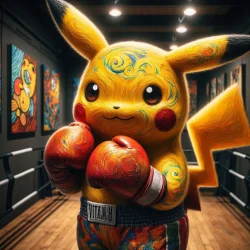Xue Sheng
All weight is underside
Not making fun, not jealous, I trained some Wing Chun and I rather like itIt looks like some fun is being made of me? Like I said : two sifus, one wutang who i was lucky taught sun style and all 3 arts , of which I excelled in. And now I am apprentice to a REAL master, I’m not sure what kind of people others trained under, but I only train under boxers. I also clearly am attuned to other areas of the art others are either skeptical of, don’t believe in, or just don’t get it. As I have often seen the “experts” reply, “you just don’t get it.”
And most of the people replying don’t even know how to play Wing chun let alone understand the “secrets” of the art. WSLVT taught by a master is unparalleled. I wasn’t aware of the jealousy people had towards wing chun until going online.
And yes, if you don’t believe in miracles you definitely would see this as Pokémon. I have seen what you people have called magic tricks. Internal is clearly something not understood by others. That’s the truth
Have a nice day

